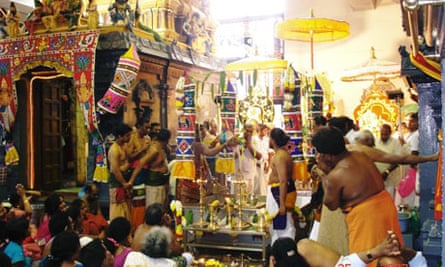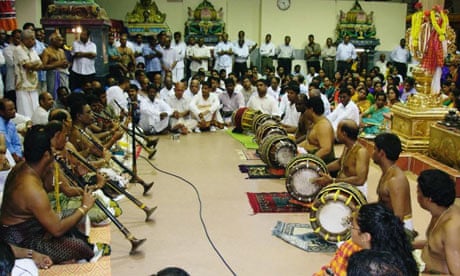"Was there a swimming pool there as well?" my mate Laurie asked when I told him about the Hindu temple I visited in Ilford. I forgive him his irreverence, because the temple in question is a converted leisure centre – and not the only one in London.
With its 13,000 gods (and counting) scattered all around India, Hinduism has traditionally had more than its share of warring factions. Accounts of disagreements between devotees of Shiva and Vishnu, the two major gods, go back to 2nd century AD. And contrary to some claims, the caste system is alive and kicking, as is the north-south divide, and naturally these are reflected in places of worship.
But the temple I saw in London had them all (so it seemed) side by side to pick from, and pray to. Some of the deities are so lined up so choc-a-bloc that you could pray to one god, and then shift your bum slightly and pray to a second.

Basically, this odd form of reconciliation is driven by lack of space and funds, and convenience for Indian professionals – with half-a-million Hindus and more than 300,000 Sikhs living in the UK, demand for places of worship far outstrips the supply.
Some of them – like the Ilford one – are simply old leisure centres converted into a makeshift place of worship, with various deities placed next to each other to allow people from different denominations to pray without having to drive out of the city. Bemused priests perform different rites at different times for different groups of people.
I was first put onto this by my aunt, who lives some of the months of the year in London. I had gone over for a home-cooked meal and found her sprawled across the sofa in exhaustion. Like most of us at one point or another, she got sucked into an outing with relatives from the more-Indian-than-the-Indians community in London, and they had dragged her along to see the Selvavinayagar temple (Vinayagar is the Tamil name for the elephant god more commonly known as Ganesha).
"The whole thing is really bizarre," she said as she dragged herself out of the sofa and headed to the kitchen to fulfil the promise of a home-cooked meal that had lured me there in the first place. "It's like having a buffet of gods to choose from!"

An hour later, suitably fed and watered, my curiosity was piqued. I got the address of the temple from her and went across to see for myself.
She was dead right. Bizarre is the only word to describe the temple.
I dragged one of the work-experience lads from my company along, and the head priest deigned to have a chat with us, after making me do a little round to pray to each of the deities.
"This is mainly a Tamil temple dedicated to Vinayagar, but we get a wide mixture of people coming," he told me in Tamil. The temple has the main Vinayagar deity placed in the centre, but other idols of gods such as Shiva and Durga cater to the North Indian worshippers in East London. How do the priests manage all of them?
"Actually, I am trained in many different rituals," he says. Having passed on the training to his two colleagues, the three priests now take turns.
"The situation has come about because people find it difficult to travel to individual temples, which are often outside the city or in the outskirts" he says. But he feels that the concept demonstrates the flexibility of Hinduism. "Hinduism is essentially flexible – but this has been forgotten in India where some temples don't allow worshippers of other religions in, others make it mandatory [for men] to take off your shirt and all that sort of thing," he said.
Big temples do have several sanctums dedicated to different gods, but these are suitably spread apart to spare the orthodox worshippers any annoyance.
I discovered soon that there was a similar temple in Highgate dedicated to Murugan, the second son of Shiva and Parvati (the first is Ganesha), reasonably close to my house, and I started going there. One day, after the puja, I decided to have a chat with some of the people there; the general consensus was that it was a reasonable solution of convenience. A lot of them simply could not afford to travel to temple spots outside of London on a regular basis, and put up with deities en masse.
Some of them even found benefits. Jaya, originally from Gujarat, said: "I did not know much about Lord Murugan - he seems to be worshipped more by Tamilians. After coming to this temple, I started doing some research, and found the history very moving. He caters to more the suppressed classes, who identify more with the younger and not-so-favourite brother. But correct me if I'm wrong!"
For Harsha Vardhan, a suit-and-tied professional, it is an exercise in nostalgia. "The music is familiar, the smells are familiar – I even saw cockroaches crawling across the floor! Nowhere else in London have I seen cockroaches, but step into an Indian temple … it's very reassuring."
Others are not as comfortable with the concept. Lakshmi Ramachandran, in London to do a course in education and visiting the temple for the first time, said: "For me it is an uncomfortable experience, but I can understand why some people find it convenient. For my mother-in-law who has health trouble, it is an easy walk from nearby."
I have to confess at this point that I'm not very religious, so I wouldn't really make the trek out of town to visit a "proper" temple. But during religious festivals, being in London away from family, you can't help feeling a bit empty - and nothing is more soothing than going over to a familiar setting, listening to familiar music, and remembering just how much you hated this sort of thing when you were a kid - and just how much you miss it now. Long live leisure centre temples I say!
